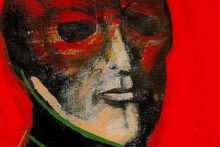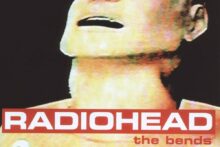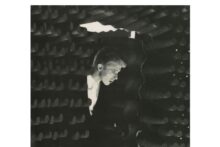‘"Heroes"’
The best-known song on Scratch My Back and therefore quite probably the bravest choice as the record’s opener, this Bowie anthem is slowed right down, in the process shorn of its confidence and swagger. But the melancholy begins to evaporate as the song progresses, the scurrying orchestrations raining down columns of sunlight by the close.
Peter Gabriel: "Heroes" for me was always one of the great Bowie tracks. It is heroism in the face of oppression and desperation; it’s something triumphant despite the desperate situation. We tried a few ways of looking at it and I wasn’t very happy, then I started manipulating some acoustic guitar samples until they became interesting, which gave me something to indicate to John [Metcalfe, Durutti Colmn, arranger/ producer] where I wanted to go with it. We had talked about such composers as Arvo Part and Steve Reich as inspiration, but when John came back with his first draft of the arrangement I was blown away and think it’s one of the best string arrangements of a rock song I have ever heard. For both of us, this gave us the confidence to be bold in the way in which we were going to approach the record. I think it’s beautiful because without any of the drive of guitar and drums which were so key to Bowie’s original, it builds an enormous tension that bursts open. For that reason I wanted it to start the record.
‘The Boy In The Bubble’
Another audacious choice and again the pace is near funereal and the arrangement sparse. Stripped of the bounce of Paul Simon’s original, the song takes on a contemplation and poignancy that wasn’t always apparent. When Peter sings, “These are the days of miracle and wonder”, the incredulity in his voice is nothing short of palpable.
Peter Gabriel: The second track in and it’s again one of my favourites, taken from Graceland which was a very big album for lots of people, which was full of joyful African exuberance. But what many people didn’t notice, and I didn’t at first realise, was what an extraordinary lyric this is. I think it’s one of the best rock/pop lyrics written in the last 25 years. It is quite dark and troubled and when you strip it back different layers are exposed. I received some good feedback from Paul by email this week saying much the same thing.
When I first talked to John about this song and the album in general I asked for very emotional, sparse arrangements – I really wanted for the songs and the words to speak.
This is probably the emptiest and stronger as a result. Paul is obviously one of the great American songwriters and has an amazing catalogue of wonderful material – great melodies and words. We discussed a few different tracks together and this was one of Paul’s top four recommendations.
‘Mirrorball’
“Dawn gives me a shadow I know to be taller/ All down to you, dear.” It’s abundantly clear why this song, one of the highwater marks of Elbow’s Mercury Prize-bagging The Seldom Seen Kid, holds such appeal for Peter. With Guy Garvey’s poetic pen producing swooning lines like “We kissed like we invented it”, John Metcalfe’s surging strings are the equal, giving Mirrorball the big-screen sheen it truly deserves.
Peter Gabriel: We came across Elbow first when they did their first album here at Real World Studios with the wonderful Steve Osborne and I really liked a remix they did for ‘More Than This’ from my Up album. When I started really listening to what they were doing I thought there was a wonderful musicality, full of inventiveness with lots of beautiful melodies. When I was trying to sing this (and it was a bitch to sing!) it reminded me of trying to sing some of the old melodies I had written with Genesis (like ‘Got To Get In To Get Out’) that were full of awkward intervals.
It is one of my favourite arrangements and has references to Stravinsky’s Rites of Spring. Often orchestral arrangements of rock songs are used to ‘sweeten’. I think these arrangements have a real integrity to them. They are not a decorated background for a rock band, but use all the colours of the orchestra to provide the heart, passion, intensity and groove.
‘Flume’
Quite possibly the revelation of the entire record. A song originally recorded by Justin Vernon (aka Bon Iver) in the solitary confinement of a snowbound Wisconsin cabin has been utterly transformed. Now the recipient of a grand, brass filled treatment, ‘Flume’ is rewarded by Peter’s soaring voice heading towards the heavens, albeit shot through with pain and desolation.
Peter Gabriel: Bon Iver was introduced to me by my younger daughter, Melanie, who’s a big fan. When I first heard this track it immediately registered. I tried singing a couple of his songs, but this was the one that I could feel instinctively. The first arrangement that John did was all based around the brass, and although I loved what he had done, it felt too heavy and lacked contrast. Very late in the day I sat down at the piano and tried to find a really simple part for the verses, which then allows the brass entry to have more meaning. There were a couple of lines of lyrics that felt awkward at first, but the more time I spent with it the more natural it became. It is a beautiful song.
‘Listening Wind’
On the records of Talking Heads, there was sometimes the danger that David Byrne’s lyrics might get lost in the band’s clever, multi-layered arrangements. Here, on one of the less celebrated songs from their 1980 masterpiece Remain In Light, things are distinctly less cluttered. The song takes a measure of the confusion of a changing world (“He feels the presence of the wind beside him/ He feels the power of the past behind him”), revived here by Peter’s insistent vocals, pushed along by urgent gusts of strings.
Peter Gabriel: Talking Heads were always one of my favourite bands and Remain in Light my favourite album – everything was firing on all cylinders, from the lyrics and the vocals to the grooves Chris and Tina were generating with Brian (Eno)’s magical production input.
My Life in the Bush of Ghosts had been a great and influential record in terms of being one of the first to really utilise sampling intelligently. They were a band that understood the bottom end of the body – the grooves as well as tickling the brain with lots of ideas and inventiveness.
In a way it is another dark lyric about terrorism, but eloquently and poetically expressed.
The big dilemma for us was whether our self-imposed rule of no drums would kill the song, as it had been built around a wonderful groove, without it, could this creature still manage walk? Although this was one of the songs that went through a lot of revisions before we nailed it, I think John has created a beautiful arc in the arrangement, despite very little harmonic movement.
‘The Power Of The Heart’
A recent Lou Reed composition, Peter abandons its author’s trademark gravelly delivery for an open vocal performance that, backed by unobtrusive piano and sympathetic orchestrations, places great emphasis on the song’s uncomplicated but moving melody. Simple things can be the most profound.
Peter Gabriel: I’ve known Lou for many years now and he’s written many great songs – he’s correctly taken very seriously as a great lyricist. At the Albert Hall when he was doing his Berlin show, he played this song at the end. It is a marriage proposal to Laurie (Anderson). I thought it was an extraordinarily beautiful lyric and song. However, I felt it needed a chorus figure or refrain to punctuate all the verses, and was quite nervous sending it back to Lou to see if he would approve this addition, as it was such a personal song. He wrote back very enthusiastically. Although Lou’s not the first name that comes to mind when you think of love songs, I am sure in years to come, because of its heart felt honesty, it will become a romantic classic.
‘My Body Is A Cage’
One of Peter’s more recent discoveries, Montreal’s Arcade Fire have forged a reputation for the intensity of their performances. Nonetheless, on this track from their astonishing Neon Bible album, Peter has ratcheted the intensity still further – an interpretation every inch as claustrophobic as the incarceration alluded to in the title.
Peter Gabriel: I love the title ‘My Body is a Cage’. My first impressions were of a man trapped in his body, not unlike the Butterfly and the Diving Bell, which I had then just seen. It also reminded me of the awkward moments in a relationship when what you are able to do, and what you want to do, are not lining up.
This was also an opportunity for John to throw a lot of paint on the canvas. The temptation was to edit the song down, and I insisted that we extend it and push it to the extreme. It won’t appeal to everyone, but I love the contrast with some of the really empty tracks.
Arcade Fire are an extraordinary group. Although large in number, there is a determined singular voice that emerges in a unique way. They have independently generated this vivid environment which they inhabit.
‘The Book Of Love’
Originally recorded by Peter some years ago this is a cult classic afforded the grand, cinematic treatment. One of the stand-outs from The Magnetic Fields’ three-disc opus 69 Love Songs, here deeply romantic strings remain unceasingly faithful to Stephin Merritt’s perceptive dissection of love’s simplicities.
Peter Gabriel: I was introduced through a friend to the Magnetic Fields, and really fell in love with the song writing and the quirky way the band interpreted their material.
This wonderful lyric is deeply romantic and a little cynical at the same time, which opens it to an audience that wouldn’t buy slush. This was the track that stood out to me on 69 Love Songs and we were working on the strings for my track ‘Signal to Noise’ at the time. I thought it would be great to hear this performed on strings and just managed to get it arranged in time and recorded during the ‘Signal to Noise’ session. Claudia from the Magnetic Fields tells me that they’re getting a lot of requests now for this particular version for wedding ceremonies, and it was used on the last episode of the Scrubs TV series, and seems to have generated its own cult following as a result. Its also lovely to be working with my daughter Melanie again on the vocals.
‘I Think It’s Going To Rain Today’
The straightest cover on Scratch My Back as it retains Randy Newman’s original goose bumper of an arrangement. The revelation is Peter’s vocal conversion into something approaching the jaded barfly who inhabited Tom Waits’ 70s records, the perfect narrator of lines like “Tin can at my feet/ Think I’ll kick it down the street/ That’s the way to treat a friend."
Peter Gabriel: For over 30 years Randy Newman’s been one of my favourite songwriters from some of the serious and cynical social comment to the beautiful pop songs he has done for film – there are always great melodies, words and arrangements. In his cynical mode he often speaks through the character he is ridiculing to great effect. There are so many of Randy’s songs that I love, but Bob Ezrin reminded me of ‘I Think its Going to Rain Today’ which he’d played me actually many years before when we were working on my first record. This is a magnificent song.
‘Apres Moi’
This reading removes the insularity of Regina Spektor’s original – her unique and idiosyncratic piano and vocal style – and gives it a true platform, right from the opening flurry of brass and woodwind that sounds not unlike a high-drama film score.
Peter Gabriel: It was my elder daughter Anna who introduced me to Regina, who she had met in New York. I thought Regina was very gifted. It was the Russian quality of this track that I loved. It quotes from Pasternak. I tried a couple of times to sing in Russian but didn’t feel I was nailing it well enough to leave in, except for the last word, which leads well into the next passionate string section. It is taken from ‘in the blackness of spring it burns’. It’s a nice cheerful Russian text as you can tell. It’s the only place on the record where I let myself loose, screaming in a way I haven’t done since the Passion record.
‘Philadelphia’
Bruce Springsteen’s contribution to the soundtrack of Philadelphia was the more celebrated, but this Neil Young track was surely the most beautiful. This version marks Scratch My Back’s tenderest moment, its gently undulating melody matched by the empathetic delivery of Young’s lyrics. Gorgeous trumpet solo too.
Peter Gabriel: When I was growing up Buffalo Springfield’s ‘For What its Worth’ was one of the most evocative songs I had heard and it was also my introduction to Neil Young, who has been making great songs ever since. He has always been a man of conscience and a pioneer. Not many people know this song, although I think it is exquisite. Sensitive lyrics, stunning melody and magical key change all make this a superb song. This arrangement has some English influences that reference Vaughan Williams and Elgar, that we built into the arrangement. It seems to be one of those tracks that grows on people the more they hear it.
‘Street Spirit (Fade Out)’
The album’s closing song is also its most unrecognisable – even the most hardcore Radiohead fan would take quite some time to identify this, the final track on The Bends . Every drop of angst present in the original remains, but the discomfort of a young adult in an overbearing world has been replaced by more middle-aged existential despair.
Peter Gabriel: Radiohead have been one of my favourite bands for a long time – they’re brilliant and bold in their composition, experimentation and always seem drawn to new challenges. John messed around with some of the chords at the end and I couldn’t get the original melody to work, so what you hear is an improvised solution to that problem. It felt to me that there was a reconciliation and sense of acceptance in that last line of lyric – "immerse yourself in love" that takes the song out of despair. A great and natural end.
Peter Gabriel’s Scratch My Back is released on 15 February through Virgin Music







